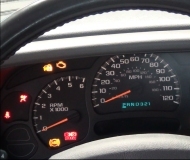Your post didn't come up under those with donations, but regardless, "thank you" if you did donate, but that isn't necessary to get our attention. You won't get an answer if no one understands the problem, no one knows of a valid and worthwhile answer, or if no details were included.
In this case, you have a number of advantages and things the mechanics can take advantage of. First of all, since the '96 models, all vehicles sold in the U.S. Have the OBD2, (on-board diagnostic system, version 2), that gets pretty involved with self-diagnostics. Second, the mechanic can drive the vehicle with a scanner connected, to view live data, AND he can make a recording of the event when it occurs. If the problem is really random and takes a long time to act up, the Chrysler dealers have a "flight recorder" they can let you take with you. Like the "record" feature on scanners, you press the button when the problem occurs, then, because the data travels through the unit's memory, the recording actually begins a few seconds before the button was pressed.
Later, the mechanic can replay the data and watch the sensor readings to see what changed. That falls under one of two categories. Some sensors are inputs to the Engine Computer and the computer reacts to those readings. Some sensors provide data on the results of what the computer did. Those don't affect how the engine runs. They report on how the engine is running. Oxygen sensors are a good example of that.
The place to start is by reading any diagnostic fault codes. Some mechanics have the mistaken idea that the Check Engine light must be on for there to be stored fault codes, but that is not true. There's well over a thousand potential fault codes, and only about half of them, (those related to something that could adversely affect emissions), must turn the light on. There can be a number of other codes in memory that don't turn the light on.
Fault codes will identify the circuit or system that needs further diagnosis, but when there aren't any, the scanner's display of live data usually provides some clues. The battery and alternator won't cause the symptoms you described, and Chrysler fuel pumps rarely quit once they've started up and the engine is running. The pickup coil in the distributor was a good suspect but they most commonly fail due to heat buildup when a hot engine is stopped and the heat migrates up to it. They often work again after they cool down for an hour.
The place I would be looking first for what you described is the crankshaft position sensor. On some models the air gap is critical, and if the special spacer isn't used, it can cause exactly what you described. On your engine the spacing can't be messed up but the sensor still can cause the same symptoms. They can fail after a "hot soak", meaning the heat migrates up to them when a hot engine is turned off, but they can also start to develop a rather weak signal that the Engine Computer may not always be able to interpret. If the signal disappears for a long enough period of time, the computer should set a fault code related to it, but it likely won't turn on the Check Engine light. I assume the thinking is the engine can't run with no signal from that sensor, so there can't be excessive emissions.
Another thing to consider is the automatic shutdown, (ASD), relay. Although failure is very rare, you might want to swap it with another relay like it, as a test. Typically the starter relay or the AC compressor relay will be the same part number. The ASD relay sends current to the ignition coil, injectors, and fuel pump or pump relay. I've never run into one with overheated and arced contacts, but I have had a few that had water and severe corrosion inside.
Wiggle the wiring harnesses too while the engine is idling. In particular, look for connectors on any harnesses that go from the body to the engine. Flexing can irritate the terminals in the connectors until one is spread and makes intermittent contact. My '88 Grand Caravan daily driver did exactly what you described after the injector harness was disconnected. Apparently I didn't have it plugged in all the way, and it caused intermittent hard bucking. Accelerating made it act up the worst when the engine rocked. Just touching the connector made the idling engine stall.
Saturday, April 12th, 2014 AT 1:49 PM




